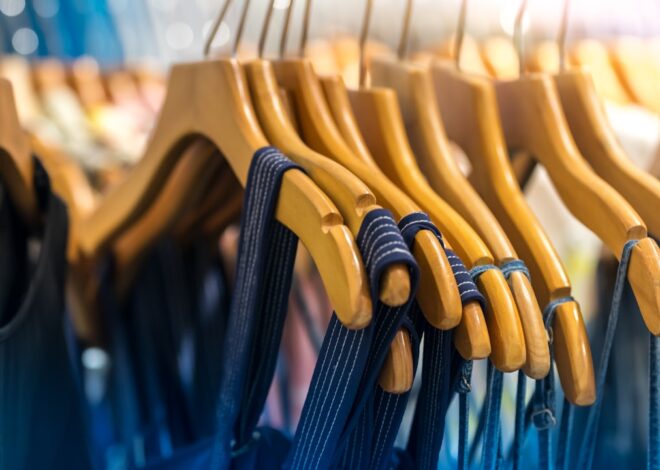
Top Ethical Fashion Brands: Sustainable Style
Ethical fashion brands prioritize the well-being of people, animals, and the environment throughout their supply chain. These companies focus on using sustainable and eco-friendly materials, ensuring fair labor practices, and minimizing their environmental impact. The ethical fashion movement has gained momentum in recent years as consumers become more aware of the social and environmental consequences of their purchasing decisions.
These brands typically implement transparent and ethical practices in all aspects of their business, from sourcing materials to manufacturing and distribution. By doing so, they aim to create a more sustainable and equitable fashion industry. Consumers who support ethical fashion brands can make a positive impact on the world while still enjoying stylish and high-quality clothing.
The commitment to ethical practices often extends beyond traditional fashion industry standards. Ethical fashion brands may prioritize the use of organic or recycled materials, implement fair wage policies, and work to reduce waste and carbon emissions throughout their production processes. Some companies also focus on animal welfare by avoiding the use of animal-derived materials or ensuring humane treatment in their sourcing practices.
As the demand for ethical fashion grows, more brands are adopting sustainable and socially responsible practices. This shift in the industry is driven by increasing consumer awareness and a desire for more transparent and responsible production methods in the fashion sector.
Key Takeaways
- Ethical fashion brands prioritize fair labor practices and sustainable materials in their production processes.
- Criteria for sustainable style include using eco-friendly materials, reducing waste, and ensuring fair wages for workers.
- Top ethical fashion brands include Patagonia, Everlane, and Reformation, known for their commitment to sustainability and transparency.
- Innovative practices in ethical fashion include upcycling, zero-waste production, and using innovative materials like pineapple leather.
- Ethical fashion has a positive impact on the environment by reducing carbon emissions, minimizing waste, and promoting sustainable farming practices.
- Social responsibility in ethical fashion involves supporting marginalized communities, promoting diversity, and ensuring safe working conditions for all workers.
- Consumer tips for supporting ethical fashion brands include researching company practices, shopping secondhand, and prioritizing quality over quantity.
Criteria for Sustainable Style
Eco-Friendly Materials
First and foremost, sustainable style involves the use of eco-friendly and ethically sourced materials. This means using organic cotton, hemp, bamboo, and other natural fibers that have a lower impact on the environment.
Minimizing Waste and Fair Labor Practices
Additionally, sustainable style also involves minimizing waste and reducing the use of harmful chemicals in the production process. Another important criterion for sustainable style is fair labor practices. Ethical fashion brands ensure that their workers are paid fair wages, have safe working conditions, and are treated with respect and dignity. This commitment to fair labor practices extends to all aspects of the supply chain, from the farmers who grow the materials to the workers who sew the garments.
Transparency and Accountability
Finally, sustainable style also involves a commitment to transparency and accountability. Ethical fashion brands are open about their production processes, including where their materials are sourced from and how their garments are made. This transparency allows consumers to make informed decisions about the brands they support and ensures that ethical standards are being upheld throughout the supply chain.
Top Ethical Fashion Brands

There are several ethical fashion brands that have made a name for themselves in the industry by prioritizing sustainability and ethical practices. One such brand is Patagonia, known for its commitment to using recycled materials and reducing its carbon footprint. Another top ethical fashion brand is Stella McCartney, which is renowned for its use of vegan leather and commitment to animal welfare.
Eileen Fisher is another leading ethical fashion brand that focuses on sustainable and organic materials, as well as fair labor practices. Reformation is a popular choice for consumers looking for stylish and sustainable clothing, as the brand uses eco-friendly materials and implements environmentally friendly production processes. Veja is a top ethical fashion brand known for its use of sustainable materials and fair labor practices.
The brand’s sneakers are made from organic cotton, wild rubber, and other eco-friendly materials, making them a popular choice for environmentally conscious consumers.
Innovative Practices in Ethical Fashion
| Practice | Description | Impact |
|---|---|---|
| Use of Sustainable Materials | Utilizing eco-friendly fabrics like organic cotton, hemp, and recycled materials | Reduces environmental impact and promotes ethical sourcing |
| Fair Trade Certification | Ensuring fair wages and working conditions for artisans and workers | Supports livelihoods of marginalized communities and promotes social responsibility |
| Zero Waste Production | Minimizing waste by repurposing fabric scraps and using efficient production techniques | Reduces environmental footprint and promotes resource efficiency |
| Transparency in the Supply Chain | Providing visibility into the entire production process and sourcing of materials | Builds trust with consumers and ensures ethical practices throughout the supply chain |
Ethical fashion brands are constantly innovating to find new ways to reduce their environmental impact and improve their ethical practices. One innovative practice in ethical fashion is the use of upcycled materials. Brands like Reformation and Patagonia are known for using recycled and upcycled materials in their clothing, reducing waste and minimizing their reliance on new resources.
Another innovative practice in ethical fashion is the use of alternative materials. Brands like Stella McCartney and Veja have been at the forefront of using innovative materials such as vegan leather and sustainable rubber in their products. These alternative materials offer a more sustainable and cruelty-free option for consumers who want to support ethical fashion brands.
Additionally, many ethical fashion brands are embracing technology to improve their supply chain transparency. Blockchain technology, for example, is being used to track the origins of materials and ensure that they are ethically sourced. This level of transparency allows consumers to have confidence in the ethical practices of the brands they support.
Impact of Ethical Fashion on the Environment
The impact of ethical fashion on the environment is significant, as these brands prioritize sustainability and eco-friendly practices throughout their supply chain. By using organic and recycled materials, ethical fashion brands reduce their reliance on non-renewable resources and minimize their carbon footprint. Additionally, these brands often implement environmentally friendly production processes, such as using natural dyes and reducing water usage.
Furthermore, ethical fashion brands often prioritize waste reduction and recycling. By using upcycled materials and minimizing waste in their production processes, these brands contribute to a more circular economy and reduce the amount of clothing that ends up in landfills. This commitment to waste reduction has a positive impact on the environment by conserving resources and reducing pollution.
Overall, the impact of ethical fashion on the environment is significant and far-reaching. By supporting ethical fashion brands, consumers can contribute to a more sustainable and environmentally friendly fashion industry.
Social Responsibility in Ethical Fashion

Fair Labor Practices
Fair labor practices are a key aspect of social responsibility in ethical fashion. Brands that prioritize fair wages, safe working conditions, and respect for workers’ rights contribute to a more equitable and just fashion industry. By supporting these brands, consumers can help ensure that garment workers are treated with dignity and respect.
Supporting Local Communities
Many ethical fashion brands also support local communities by sourcing materials from small-scale producers and artisans. This not only helps to support local economies but also preserves traditional craftsmanship and cultural heritage.
Promoting Diversity and Inclusion
Social responsibility in ethical fashion also involves promoting diversity and inclusion within the industry. Brands that prioritize diversity in their hiring practices and representation in their marketing campaigns contribute to a more inclusive and representative fashion industry.
Consumer Tips for Supporting Ethical Fashion Brands
For consumers looking to support ethical fashion brands, there are several tips to keep in mind. First and foremost, it’s important to do your research and look for brands that prioritize sustainability, fair labor practices, and transparency. Look for certifications such as Fair Trade or GOTS (Global Organic Textile Standard) to ensure that the brand meets certain ethical standards.
Additionally, consider investing in high-quality pieces that are made to last, rather than fast fashion items that contribute to waste and pollution. By choosing timeless pieces that are well-made and durable, you can reduce your environmental impact and support brands that prioritize quality over quantity. Furthermore, consider supporting local and independent ethical fashion brands, as these often have a smaller environmental footprint and contribute to local economies.
By shopping locally and supporting small businesses, you can make a positive impact on both the environment and your community. Finally, don’t be afraid to ask questions and hold brands accountable for their ethical practices. Reach out to brands directly or engage with them on social media to inquire about their sustainability initiatives and ethical standards.
By being an informed and conscientious consumer, you can make a difference in the fashion industry by supporting ethical fashion brands that prioritize people, animals, and the planet.
If you’re interested in learning more about ethical fashion brands, you should check out this article on Otter Fashion’s website. They have a great piece on the top 10 ethical fashion brands that are making a positive impact in the industry. Otter Fashion is a great resource for anyone looking to support sustainable and ethical fashion choices.
FAQs
What are ethical fashion brands?
Ethical fashion brands are companies that prioritize ethical and sustainable practices throughout their entire supply chain, from sourcing materials to production and distribution. These brands often focus on fair labor practices, environmentally friendly materials, and transparency in their operations.
What are some common ethical practices of fashion brands?
Some common ethical practices of fashion brands include using sustainable and eco-friendly materials, ensuring fair wages and safe working conditions for workers, minimizing waste and pollution in the production process, and being transparent about their supply chain and business practices.
How can I identify ethical fashion brands?
You can identify ethical fashion brands by looking for certifications such as Fair Trade, GOTS (Global Organic Textile Standard), or B Corp. Additionally, you can research the brand’s website and look for information about their sourcing and production practices, as well as any commitments to sustainability and ethical labor practices.
Why should I support ethical fashion brands?
Supporting ethical fashion brands helps promote fair labor practices, reduces environmental impact, and supports the overall well-being of workers in the fashion industry. By choosing to support ethical fashion brands, consumers can contribute to a more sustainable and responsible fashion industry.


